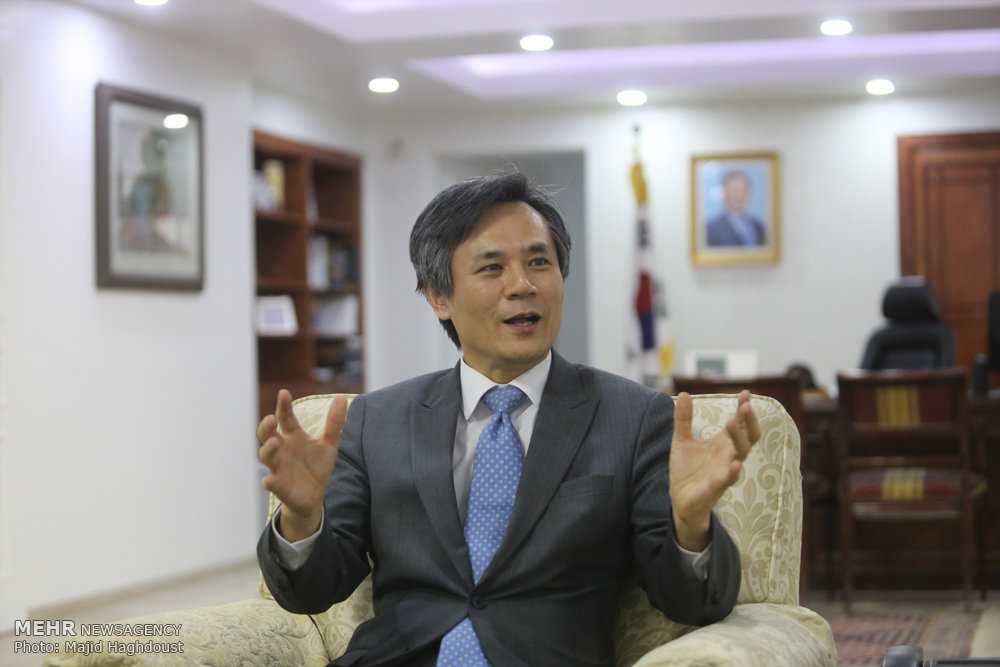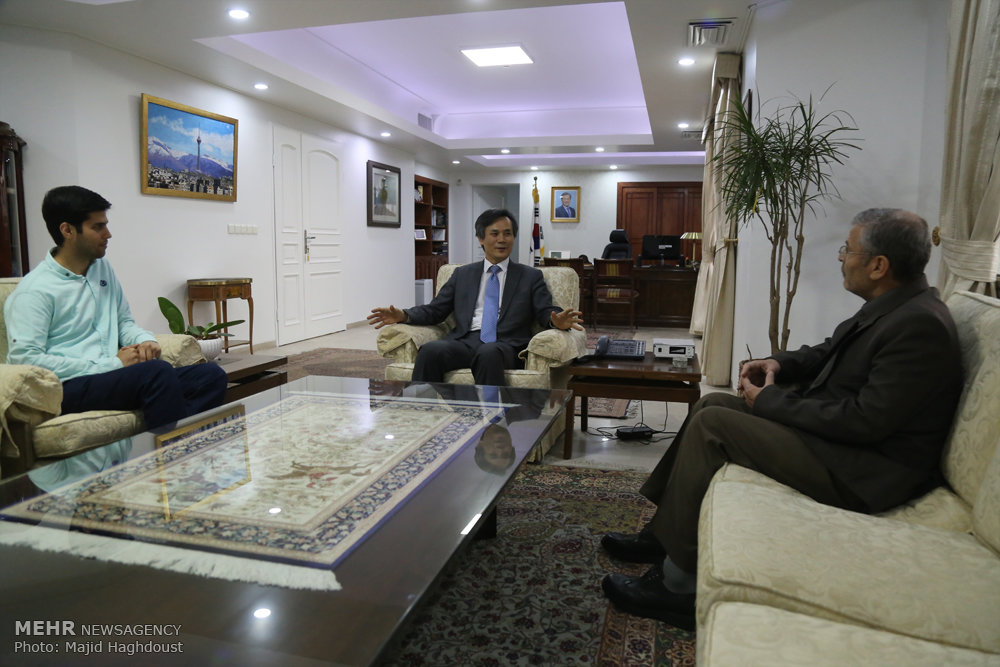Iran much bigger country than you think, Korean ambassador tells Iranians
‘Iran is one of the strategic countries shaping the world’s politics.’

TEHRAN - In an exclusive interview with the Tehran Times, South Korea’s outgoing ambassador says, “One thing I would like to tell my fellow Iranians is that Iranians shall know that Iran is a much bigger country than you think.”
“But what I found in Iran, many Iranian people do not know that their country is way bigger in the international scene,” Kim Seung-ho notes.
Below is an excerpt of the interview:
Q: Iran and South Korea signed 19 cooperation documents in May 2016 during President Park’s visit to Tehran. The Korean side agreed to provide $25 billion in finance for infrastructure projects in Iran. Are these agreements still in the pipeline?
A: Well, the public credit agreement is already signed. What she pledged to the Iranian side is that Korea is willing to provide credit lines up to $15 billion. So in July 2017, the Central Bank of Iran and Korean Eximbank signed the so-called framework agreement which will provide almost $10 billion to Iranian projects. That agreement is already signed. What is left is the implementation procedure. In order to reimburse the Korean credit line, the Iranian company and Korean company, together they apply for Korean bank through Iranian bank to make a loan of this agreement. So this procedure is being carried on. But the umbrella agreement is already signed and actually it was signed for the first time with Iran. No other European countries did that and Korea was the first to sign that document.
‘I think Iranian people should be proud of their country, culture and current status in the world.’What the Korean president pledged is that Korea is ready to open the credit line in order to grant a loan under a Korean pact.
Under the pact, the state is a part of the shareholders but there are other big private shareholders too. So these semi-public Korean banks, they were willing to make a loan to the Korean company who will participate in Iranian project if Iranian government will give a sovereign guarantee of that project. In order to use that money, the Korean company and the Iranian company apply to the Korean bank for a loan. Then Korean company will then review that project – whether it is really profitable and commercially viable. And then the Iranian government should give a sovereign guarantee, meaning if the Iranian company cannot pay back the Korean loan, then the Iranian government will pay.
Q: Mr. Ambassador, is there any projects now under construction? For example, there was news that Korea is trying to build hospitals in Iran.
A: Yes, the Korean company is now discussing a maximum of nine hospitals, but some of them are only on the paper. There are some serious discussions between the Korean company and the Iranian side.
Q: Mr. Ambassador, in an article that you wrote in the Tehran Times, you said Iran is not just a producer of oil and gas and that Korea is not just limited to Yang Geum. With regard to your views and since Koreans are not that much familiar with Iran, its culture and history, and some of them even think that Iran is an Arab state, what did you do during your tenure to introduce Iran to the Korean people?
A: That was one of my major goals during my stay as ambassador. I have a background in economics, so the economic cooperation is the pillar of our two countries’ relations. The more two countries are focused on economy, the shakier and riskier their relations will be. Iran and Korea are focusing too much on economy. If something happens in this area, the two countries’ relations are not strong enough. So that’s why even though my background is economics, I intentionally set aside economy in my work and focus my time and effort to introduce Iranian culture and Iranian people to Korean people. I made a lot of efforts to make Korean people much more familiar with Iranian people.
Iran and Korea are focusing too much on economy. If something happens in this area, the two countries’ relations are not strong enough. So that’s why even though my background is economics, I intentionally set aside economy in my work and focus my time and effort to introduce Iranian culture and Iranian people to Korean people.Q: Do you have any figures about the number of Koreans visiting Iran as tourists?
A: Not exactly. Around ten thousand people, but most of them are the businessmen so they come here for their business, or they are employees of large Korean companies like Samsung or LG, so they do not contribute much to expand Korean knowledge about Iran. The number of tourists has not increased much. There are two reasons for that, one is the lack of a direct airplane service between Tehran and Seoul. I tried but the Korean company was still reluctant. The other reason is that Iranian cultural heritage is not so much introduced to the Korean side. Many Koreans believe that Iran is mostly covered by deserts. Yes, it is half-true, but a few month ago in Tehran and many other places we had a very heavy snow. That lack of knowledge is an issue.
Q: Mr. Ambassador, do you have anything special to say about your work in Iran, especially now that your mission has ended?
A: First of all, I am very honored and pleased to have been ambassador at the time of the great expansion of relations between the two countries. During my stay, our trade volume more than doubled. Last year, we exported $14 billion to your country and we imported $8 billion Iranian goods, which is a 40 percent increase compared to the year. As ambassador, it is quite an honor to witness such a development. And also I especially thank my Iranian colleagues who have helped me accomplish such achievements. Without those Iranian government officials, I could not enjoy this kind of pleasure. I also deeply appreciate Iranian people’s hospitality, interest to Korea and Korean people.
Q: The approach that your current administration has taken toward North Korea is appreciable; it can help lead to a de-escalation of conflicts on the Korean peninsula and a possible reunification of the divided Korea. What are your expectations?
A: This is a very historic event and I’m sure that the presidents of North and South Korea surprised all of the world by making a historic deal. I think the meeting is a breakthrough in making a solid peace on the Korean peninsula.

Q: As you know Donald Trump has threatened to quit the UN-endorsed nuclear deal between Iran and world powers. Don’t you think that an abrogation of the agreement would push the world toward insecurity and anarchy?
A: You have the right to use nuclear technology for peaceful purposes. And also, Iran is a member of the NPT, so what you are doing is totally different from what North Korea has done. What I believe is that in the diplomatic world, the Iranian diplomats are very capable and very effective, and the JCPOA is an evidence of that. I myself spent 30 years in diplomatic world, dealing with many other countries, so I know that it is not easy to put your request through to the big countries’ representatives, but Iran did. The Iran nuclear deal is not a one-by-one agreement, it is Iran versus the biggest powers in the world. But Iranian diplomats succeeded in making a deal with these countries, so I think Iranian diplomats will also be effective in the future of the deal. How Europeans, China, Russia and then the United States will do, I refrain from commenting on that part, but I believe the Iranian government will succeed to preserve this deal. That is my hope and I have trust in that.
Q: What signal does Trump’s approach to the JCPOA send to North Korea?
A: That is what North Korean people shall consider not South Korean diplomats, but what I can say is that the issue between North Korea and the U.S. is quite different from that of Iran and the U.S.
Q: Iran, like the Republic of Korea, wants to use nuclear technology for civilian uses. However, in regard to your experience of North Korea, can the language of threats prove effective in dealing with a country?
A: I do not believe in the language of threats. But I do believe that dialogue is a much more effective and solid way to bring peace. What the Korean government so far has done is to persuade North Korea to have a dialogue to bring peace. I take lessons from Iran on that part because the Iranian government succeeded in bringing some international agreement to solve the nuclear issue through dialogue, so in that part I will appreciate the Iranian government’s work and I appreciate the Iranian government’s commitment to preserve the deal, and that’s why I expect the Iranian government to succeed again to preserve the deal through dialogue.
Q: Is there anything else you would like to say?
A: Well, as an ambassador in Iran I have met many Iranians. And I’m very much admire Iranian people’s maturity and their philosophy. One thing I would like to tell my fellow Iranians is that Iranians shall know that Iran is a much bigger country than you think. In the international field, Iran is a much stronger country than Korea. Iran is a big country to have a face-to-face dialogue with the United States, Russia and China. Iran is one of the strategic countries shaping the world’s politics. But what I found in Iran is that many Iranian people do not know that their country is way bigger in the international field. Every time I met Iranian students, I say that be proud of your country. Sometimes they tell me, Korea is economically very developed, sometimes they envy Korea but when I see my country versus Iran in the international field, I see that Iran is a much more important country than Korea, so I think Iranian people should be proud of their country, of their history, culture and their current status in the world.
Leave a Comment